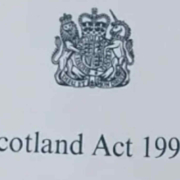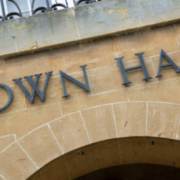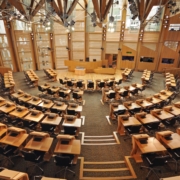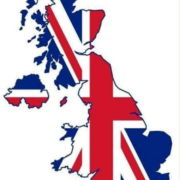Written by Stephen Bailey.
The latest (2024-25) GERS Report underlines the collective economic strength of being in the United Kingdom. The pooling and sharing of resources across the UK means that Scots benefit by £2,669 more per head in public spending than the UK average (the same is true for Ulster and Wales, who receive a similarly substantial fiscal benefit from being in the UK), which equates to substantially more money for schools, hospitals, and other public services. Scotland makes up around 8.2% of the UK population, but 9.1% of UK public spending was in Scotland. Separating Scotland from the rest of the UK would mean the end of such fiscal transfers and so vastly less money for Scotland’s public services, coupled with ultra-austerity possibly for decades to finance the risible services that would manage to avoid being axed due to lack of funds.
The latest GERS figures demonstrate that the ‘independence’ agenda is effectively over, fueled by the party’s declining popularity (it only ever had a maximum of 36% of the vote of the overall Scottish electorate anyway and usually lower than this), leadership turmoil, and poor performance in recent elections.
Multiple commentators and political figures have concluded that Scottish independence is dead. Scottish Conservative leader Russell Findlay stated the ‘dream of Scottish independence is dead’ in his first major speech as leader. Former SNP figures like Alex Salmond and Nicola Sturgeon have failed to advance the cause, with their leadership marked by controversy and policy failures. The resignation of First Minister Humza Yousaf, described as a ‘milestone’ marking the end of the SNP’s dominance, is cited as a key moment symbolising the demise of the ‘independence’ project. The movement’s lack of momentum is further illustrated by sparsely attended rallies, with one speaker admitting crowds are getting smaller.
Even the separatists themselves can see that Scots have rejected their agenda, though they’re not honest enough to publicly admit it means the end of their push for ‘independence’.
In addition to the above, the hard data clearly show that the majority of Scots don’t support the separatist agenda.
The SNP’s claim to have derived a mandate for separation by receiving a majority of votes from the public in elections—whether at Westminster, Holyrood, or local council—doesn’t survive the objective scrutiny and rigorous examination of the objective, verifiable, empirical data.
In the 2014 independence referendum, ‘Yes’ received only 1,617,989 votes (44.7%), a losing minority. ‘No’ received 2,001,926 (55.3%) votes on a turnout of 84.6%, the highest recorded turnout for an election or referendum in the United Kingdom since universal suffrage began. The registered voters numbered 4,283,392.
LET’S LOOK AT THE VOTING PERCENTAGES
2015 (Westminster) -SNP: 1,454,436. This was the high-water mark of the SNP’s success and it represented 36% of the total Westminster Parliament electorate in Scotland at the time of 4,035,400.
2016 (Holyrood)-SNP: 1,059,898 over all constituencies. 953,587 over all regions. The average of both votes is 1,006,743, which is 25% of the total registered electorate for the Holyrood election of 4,030,000.
2017 (Westminster)-SNP: 977,569. This was a drop of 476,867 from the 2015 election for the nationalists. This represented 24.9% of the total Westminster Parliament electorate in Scotland at the time of 3,930,000.
2019 (Westminster)-SNP: 1,242,380 of the popular vote. This represented 30.65% of the total Westminster Parliament electorate in Scotland at the time of 4,053,100.
2021 (Holyrood)-SNP: The SNP got 1,291,204 at the constituency level, and 1,094,374 over all the regions. The average of both votes is 1,192,789 which is 27.9% of the total registered electorate for the Holyrood election of 4,280,923.
This is far less than a third of the eligible electorate.
TO CONCLUDE
The SNP has no mandate for ‘independence’.
Its victories at Holyrood, Westminster and local council elections represent nothing more than the triumph of a small, vociferous minority (never higher than 36% of the total electorate’s vote) of activists running around and shouting the loudest, drowning out the voice of the overwhelming majority.
They only prove that a small and determined group of obsessed, loud and active zealots and extremists can force their will on the rest of the population, completely skewing the genuine will of the majority of the overall population.
Winning a majority of seats in Holyrood and a majority of Westminster seats in Scotland didn’t give the SNP any mandate for independence when they only represent around a third of the total registered electorate AND the vast majority of opinion polls on ‘independence’ in Scotland continue to show a majority for Scotland staying in the Union.
Click on the following link to see a table of opinion polls on ‘independence’ in Scotland: https://ballotbox.scot/independence/
The SNP think they are living in the Middle Ages, in a time when the autocratic aristocratic elite ruled by the divine right of kings.
They think they are born to rule over Scotland, irrespective of how competent they are to perform this function and for anybody to even suggest otherwise constitutes some kind of heresy that they are permitted to crush with the zeal of righteous indignation.
They give lip service to modern ideas and pretend to be ‘progressive’ and ‘democratic’, but the fact is they only won around a third of the votes of the total Scottish electorate at the last Holyrood election.
The SNP have no mandate for ‘independence’, however they try to justify it.
Under UK Constitutional Law, no party can obtain a mandate for ‘independence’ from a devolved election because it’s a reserved matter, irrespective of whether or not it’s in their manifesto or how many of the total electorate voted for it (they only received a minority of the total vote anyway). Only the Union Parliament at Westminster can deliver a lawful, constitutionally valid mandate for ‘independence’.
Furthermore, they were mostly voted for by a small percentage of cult ish SNP activists who would vote for them whatever the circumstances. This is because they want ‘independence’ (in fact, they just want separation from the hated England and the rest of the UK, not genuine independence) at any cost (‘independence transcends [absolutely] everything’ as Sturgeon once put it).
What’s more, the vast number of opinion polls in Scotland consistently show a majority of Scots favour staying in the Union. Gaining a mandate from a Holyrood election to form a devolved administration from around a third of the total electorate does not equate to a mandate for ‘independence’. Added to this, on ‘Sunday with Laura Kuenssberg’ (BBC) current SNP leader Humza Yousaf once stated: ‘It is pretty obvious that independence is not the consistent settled will of the Scottish people’. So, there it is, straight from the horse’s mouth. Even the SNP realize that the majority of Scots don’t want ‘independence’, but their sense of entitlement means they ignore this inconvenient truth and pathologically attempt to force their agenda on an unwilling Scotland.
To summarise:
As previously stated, under UK Constitutional Law, it’s impossible for any party to receive a mandate for ‘independence’ from a devolved election, irrespective of what’s in their election manifesto or what the political aims of the party are (i.e. ‘independence’).
The broad panoply of current opinion in Scotland reveals the following picture. The SNP were the largest party at the last Holyrood election and so can form a devolved administration. However, that’s the extent of their mandate from the public. That could change at the Holyrood election next year.
Irrespective of their reason for existing being to separate Scotland from England or whether ‘independence’ is in their manifesto-they are a devolved administration, not the national government of an independent sovereign state and, as such, shouldn’t get involved in reserved matters such as the Constitution (’independence’).
They received far less than a third of the vote of the total electorate at the last Holyrood election. More people voted for pro-Union parties than for pro-independence ones at the 2021 Holyrood election. Most opinion polls on independence have shown a majority for Scotland staying in the Union.
The bottom line remains that the SNP have no mandate under UK Constitutional Law or from the electorate for ‘independence’.
They are a minority government imposing their will on the majority.
The SNP is like the clan leaders of old. They covertly run both SNP and Scottish affairs with a Medieval clannish autocratic and domineering hand, like a clan leader or monarch might have done centuries ago, guided by a mostly distorted, highly romanticised view of Scotland’s past that has been altered to suit their agenda and infused with a massively distorting sense of Scottish exceptionalism.
They have a strangely Medieval and elitist mindset. They are stuck in a bygone era, still trying to refight the battles of that past, pathologically attempting to correct history, which they erroneously believe has gone in the wrong direction and done them a disservice.
The trouble with their approach is that it’s based on a deeply flawed misunderstanding of history which has been skewed by ideology, by prejudice against England and many substantial fatal weaknesses in their case for ‘independence’, all of which destroy their case for separation from the rest of the UK.
They make mistake after mistake, time, and time again, with Scots suffering as a result. Their top spokespeople are demonstrably shown to have no idea what they are talking about and that the SNP have no credible plans for ‘independence’. Ironically, they are as autocratic, repressive and entitled as King John of England.
They have spent the last 18 years ignoring their role at Holyrood of running Scotland’s day-to-day affairs. Instead, they have pursued separation from their bête noire, the hated England, as the living and working conditions of ordinary Scottish citizens get progressively worse (something that doesn’t concern them much, separating Scotland from the rest of the UK is their only real concern; anything else is secondary).
Meanwhile, all the SNP do is ignore the situation and monomaniacally push on with their separation obsession, insulated from reality in their minds only by what they believe to be their divine right to rule.
‘Independence’ is dead. So, why does the SNP and the wider separatist movement insist that they have a divine right to force their agenda on an unwilling Scotland?
The facts are clear: separating Scotland from the rest of the UK (’independence’) has only a small minority support among Scots and is just not economically viable, as GERS, which the SNP’s own Chief Economist certifies as 100% accurate and impartially produced, demonstrates.
HARD FACT: ‘INDEPENDENCE’ IS DEAD. MOST SCOTS SUPPORT THE UK UNION AND HAVE CONSISTENTLY REJECTED THE SEPARATIST AGENDA.
THE SNP AND THE WIDER SEPARATIST MOVEMENT JUST REFUSE TO ACCEPT THIS FACT.
SOURCE and NOTE: Electorate figures are those found via the Office for National Statistics by clicking HERE:
Note: Electorate figures are calculated on 1st December each year, and released the following year. That means if we want to know the electorate figures for, say, the Holyrood election in May 2016, we need to consult the “Electoral statistics, UK: 2015” which were calculated on 1st December 2015 and released in February 2016. The electorate figures for the Westminster Election in Scotland, and the electorate for the Holyrood/Local Elections, are different because the franchise is wider for the latter, and includes EU citizens, and since 2016 inclusive, 16-year-olds.









